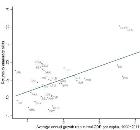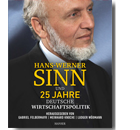
 |
| Issue 6/2016 |
New: Ifo Center for the Economics of Education is now on Twitter | |
The Ifo Center for the Economics of Education will now also be tweeting news from the Center on Twitter. The followers of @ifo_Education
will receive tweets on new study results, interesting events and current media contributions. Follow us at @ifo_Education !

|
|
| Back to top | |
Recent Research Topics |
What International Comparisons Say about the Importance of School SystemsStudents in some countries perform much better on international achievement tests than students in other countries. Is this all due to socioeconomic and cultural differences, or do school systems make a difference? In a recent article in the Journal of Economic Perspectives – the journal with which the American Economic Association seeks to close the gap between specialized academic journals and the general press – Ludger Woessmann of the Ifo Center for the Economics of Education argues that the evidence from international student tests suggests that school systems are very important. In particular, the institutional structures such as external exams, school autonomy, competition, and tracking play a significant role in the international differences in student achievement. more... |

|
Ifo Education Survey 2016 on Teachers’ OpinionsTeachers’ opinions on many topics of education policy differ from those of the overall population. This is evident in the Ifo Education Survey 2016, a representative opinion poll of the adult population in Germany which specifically surveyed teachers this year. In contrast to the population as a whole, the majority of teachers favor higher teacher salaries and their appointment as tenured civil servants. But they are mostly opposed to an all-day school system, the inclusion of children with learning difficulties in regular schools, and incentive payments for learning progress. The majority of teachers and other Germans agree, however, on obligatory professional development courses for teachers, entrance exams for teacher training courses, nationwide comparable tests, and delaying secondary school tracking after grade six. more... |

|
Germans Skeptical about Refugees’ Level of EducationThree quarters of Germans assess the average education level of refugees as low. Accordingly, the majority also does not believe that refugees will help to reduce the shortage of skilled workers in the German economy. This is the result of this year’s Ifo Education Survey, which also asked participants about their opinions on educational measures for the integration of the refugees. A large number of measures have majority approval: publicly-funded compulsory language courses, an extension of compulsory schooling to the age of 21 years, a two-year residence permit after completing an apprenticeship, an even regional distribution of refugee children to the schools, additional federal funds for social workers, language teachers and psychologists in schools, and a tax-funded obligatory attendance of early childhood education for refugee children starting at age 3. more... |

|
A Competition-based Concept for the School SystemAs an instrument to create equal starting opportunities for all children, education policy should become the central pillar of the social market economy. In a new study, Ludger Woessmann has developed a competition-based concept for the German school system to achieve the best possible educational outcome for all youths. The state would concentrate on the framework conditions and monitor whether the educational goals are achieved, but would otherwise leave plenty of freedom for parents and schools. The competition framework has five elements: 1. comparable interim and final examinations, 2. freedom of school choice and autonomy of public schools, 3. competition from privately operated schools, 4. reduced tracking of the school system, and 5. competition among the German states for the best education policy. more (in German)... |

|
Returns to Skills Higher in Dynamic CountriesWhy do skills have larger returns on the labor market in some countries than in others? To address this question, Simon Wiederhold and Ludger Woessmann of the Ifo Center for the Economics of Education, together with Ifo research professors Eric Hanushek (Stanford) and Guido Schwerdt (Konstanz), examine the PIAAC data, the so-called “Adult PISA”, extended by nine to now 32 countries in the second wave. Singapore and Chile, two of the newly added countries, have the highest returns to skills and Greece the lowest. The researchers discovered that returns to skills are systematically larger in countries that have grown faster in the recent past. This finding is consistent with the interpretation that an important element of the economic importance of education is the ability to adapt to dynamic economic change. more... |

|
The Role of Schools for Nation Building in 19th-Century PrussiaTwo new studies from the Ifo Center for the Economics of Education examine the role played by the school system in the late 19th century during the Kulturkampf and in the formation of the German nation state. For this, Prussian county-level data were compiled and linked over time. In the first study, Ruth Schüler finds that the centralized school inspections introduced during the Kulturkampf increased school attendance rates in denominationally mixed regions. In purely Catholic areas, at which the measures were specifically aimed, however, they had no effects due to Catholic resistance. more... In the second study, Ruth Schüler and Francesco Cinnirella show that central spending on education increased the share of votes for pro-nationalist parties in the Reichstag elections. This was particularly true in areas with a larger share of minorities. In this sense, the elementary school seems to have functioned as a “factory of loyal citizens” in the context of German state building. more... |

|
Overview of 25 Years of German Economic Policy – Now Online“Hans-Werner Sinn und 25 Jahre deutsche Wirtschaftspolitik” is the title of the book that Ludger Woessmann edited together with Gabriel Felbermayr and Meinhard Knoche to mark the retirement of Ifo’s former President. In the book, 111 well-known experts from academia, politics, business, and the media reflect on the most important economic policy debates from German reunification to the euro crisis. The complete volume is now available on the Internet as a free download. more... |

|
| Back to top | |
Call for Nominations for the Prize for the Best Dissertation in the Economics of Education 2015/16 | |
|
To promote outstanding research in the economics of education and to provide it with public visibility, the Committee for the Economics of Education of the German Economic Association (Verein für Socialpolitik), chaired by Ludger Woessmann, awards a prize of 2,000 euros for the best dissertation in the area of economics of education in the years 2015/16. In addition to scientific excellence, societal relevance is an important selection criterion. Applications must be submitted by 31 December 2016. more... |

|
| Back to top | |
In the English News |
Can international exam rankings tell us how to improve American education?A “Research Highlight” on the website of the American Economic Association covers Ludger Woessmann’s paper in the Journal of Economic Perspectives. more... |
How can European education systems be improved?The online discussion platform Debating Europe interviews Ludger Woessmann on the education systems in Europe. more... |
Is your government a big spender?The IZA Newsroom reports on a study by Philipp Lergetporer, Guido Schwerdt, Katharina Werner, and Ludger Woessmann on how information affects citizens’ support for public spending. more... |
The blob is wrong: Competition between schools raises standards the world overA contribution in City A.M. on the work of Ludger Woessmann on international student achievement tests. more... |
Essential reading – Well doneWolfgang Franz, former chair of the German Council of Economic Advisors, reviews the book “The Knowledge Capital of Nations” by Eric Hanushek and Ludger Woessmann in the Journal of Economics and Statistics. more... |
In the German News |
Longer Compulsory Schooling for RefugeesThe results of the Ifo Education Survey were again reported in a wide range of media, for example in Spiegel online and Zeit online, in the Süddeutschen Zeitung, Frankfurter Allgemeinen Zeitung, Die Welt and Tagesspiegel, bei 3sat nano and in Deutschlandfunk. |
Massive ResistanceDie Zeit interviews Ludger Woessmann on what the results of the Ifo Education Survey on the opinions of teachers mean for the future of our schools. more (in German)... |
What Germans Want for their SchoolsInterview with Ludger Woessmann in the Augsburger Allgemeinen on the results of the Ifo Education Survey. more (in German)... |
National Exams and Competition: The School System Needs ReformsIn the economists’ blog on Focus Money online, Ludger Woessmann discusses his study on a competition concept for the German school system. more (in German)... |
More Competition for the SchoolsTagesspiegel reports on a study by Ludger Woessmann on a competition framework for the German school system. more (in German)... |
More Competition for a Better School System?Deutschlandfunk reports on the study by Ludger Woessmann on competition in the German school system. more (in German)... |
We Lead in Terms of InequalityAn interview with Ludger Woessmann on inequality in the education system in the Bayerischen Staatszeitung. more (in German)... |
Education Makes Rich but not EqualIn its series on inequality, the Frankfurter Allgemeine Sonntagszeitung quotes Ludger Woessmann on the link between education and inequality. more (in German)... |
Poor Stays Poor – the Myth of Equal OpportunityThe TV program DokThema in BR Fernsehen interviews Ludger Woessmann on equal opportunity in the German education system. more (in German)... |
Young, Motivated, but with Large Knowledge GapsThe Frankfurter Allgemeine Zeitung quotes Ludger Woessmann in a contribution on the integration of refugees into the labor market. more (in German)... |
Only a Small Portion Makes it into Skilled OccupationsInterview with Ludger Woessmann in the Wiener Zeitung on the qualifications of refugees. more (in German)... |
Boost or Competition? Refugees in Schools and Labor MarketInterview with Ludger Woessmann on the topic of refugees in schools and the labor market in Debattencheck on the Website Wissenschaft im Dialog. more (in German)... |
Baby Boom in Germany among Foreign-born MothersDie Welt quotes Ludger Woessmann on the integration of children with migration background in the German education system. more (in German)... |
Central Exit Exams: What Germany Can Learn from Austria’s School SystemDie Welt refers to Ludger Woessmann in its article on central school-leaving examinations. more (in German)... |
Poor Access to Education DataContribution in BR2 radioWelt on the poor access to education data with an interview with Ludger Woessmann. more (in German)... |
Last Chance for Good SchoolsPortrait of Ludger Woessmann in the book „Denk doch, wie du willst – Überraschende Einblicke von Deutschlands wichtigsten Ökonomen“ published by the Süddeutsche Zeitung Edition. more (in German)... |
| Back to top |
Selected Events | |
CESifo Area Conference on the Economics of EducationFor the eighth time, leading international education economists met at the Ifo Institute on 2 and 3 September 2016 to discuss their latest research projects at the CESifo Area Conference on the Economics of Education organized by Eric Hanushek of Stanford University and Ludger Woessmann. The Jacobs Foundation Lecture was delivered by Joseph Altonji of Yale University. more... |
 |
Conference: “Developing Perspectives Together – Utilizing Potentials”At the German specialist conference “Perspektiven gemeinsam entwickeln – Potenziale besser nutzen” on 8 and 9 September 2016 in Berlin, Sven Resnjanskij of the Ifo Center for the Economics of Education gave a lecture on "Scientific Findings on the Effectiveness of Mentoring". more (in German)... |
|
New Lectures Available OnlineLectures by Ludger Woessmann on “The Knowledge Capital of Nations” in Prague and on “A Competition Concept for the German School System” in Berlin are available online. |
 |
| Back to top | |
Recent Publications |
Articles in Refereed JournalsLudger Woessmann, “The Importance of School Systems: Evidence from International Differences in Student Achievement”, Journal of Economic Perspectives 30(3): 3-32, 2016. |
Other ArticlesMarc Piopiunik, Guido Schwerdt and Ludger Woessmann, “Zentrale Abschlussprüfungen als Steuerungsinstrument im Schulsystem: Arbeitsmarkteffekte und Wirkungsmechanismen”, in: Bundesministerium für Bildung und Forschung (ed.), Steuerung im Bildungssystem: Implementation und Wirkung neuer Steuerungsinstrumente im Schulwesen, Bildungsforschung vol. 43, Berlin: BMBF, 68-83, 2016.Regina T. Riphahn and Ludger Woessmann, “Mehr Transparenz in der Bildungspolitik”, Wirtschaftsdienst 96(7): 474-478, 2016. Ludger Woessmann, Philipp Lergetporer, Franziska Kugler and Katharina Werner, “Denken Lehrkräfte anders über die Bildungspolitik als die Gesamtbevölkerung? - Ergebnisse des ifo Bildungsbarometers 2016”, ifo Schnelldienst 69(17): 19-34, 2016. Ludger Woessmann, Philipp Lergetporer, Franziska Kugler and Katharina Werner, “Bildungsmaßnahmen zur Integration der Flüchtlinge – Was die Deutschen befürworten”, ifo Schnelldienst 69(17): 35-43, 2016. |
Working PapersFrancesco Cinnirella and Erik Hornung, “Land Inequality, Education, and Marriage: Empirical Evidence from Nineteenth-Century Prussia”, CESifo Working Paper 6072, September 2016.Francesco Cinnirella and Ruth Schüler, “Nation Building: The Role of Central Spending in Education”, CESifo Working Paper 6103, September 2016. Eric A. Hanushek, Guido Schwerdt, Simon Wiederhold and Ludger Woessmann, “Coping with Change: International Differences in the Returns to Skills”, NBER Working Paper 22657 and CESifo Working Paper 6114, September 2016. Ruth Schüler, “Centralized Monitoring, Resistance, and Reform Outcomes: Evidence from School Inspections in Prussia”, Ifo Working Paper 223, 2016. |
| Back to top |
Imprint | |
|
The Newsletter of the Ifo Center for the Economics of Education is a free e-mail service which informs about new research results, publications, events, and more from the Ifo Center for the Economics of Education. You can download previous issues of the newsletter in the archive.
Subscribe
| Unsubscribe
| Feedback
| Twitter Your data will be stored internally by CESifo Group for dispatch of the Newsletter of the Ifo Center for the Economics of Education. It will be treated confidentially and will not be handed on to third parties. For more information see Privacy Policy. You can also visit the website of the Ifo Center for the Economics of Education. Or send us an e-mail at bildungsnews@ifo.de. Copyright © Ifo Institute 2016. Status: November 2016 Editor: Ifo Center for the Economics of Education, Ifo Institute – Leibniz Institute for Economic Research at the University of Munich, Poschingerstrasse 5, 81679 Munich
| |